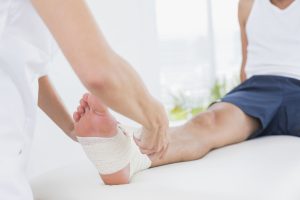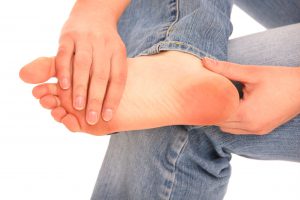Medically Reviewed by Dr. Rachel N. Verville
July 5, 2017
 People don’t tend to give much thought to the state of their Achilles tendon until an injury occurs. The Achilles tendon connects your calf muscle to your heel bone, so when it’s badly hurt, even the prospect of walking around Frisco can seem like an unimaginable task. But how can you be sure you’re suffering from some type of Achilles tendon injury? What symptoms should you be looking for before making an appointment with a podiatrist?
People don’t tend to give much thought to the state of their Achilles tendon until an injury occurs. The Achilles tendon connects your calf muscle to your heel bone, so when it’s badly hurt, even the prospect of walking around Frisco can seem like an unimaginable task. But how can you be sure you’re suffering from some type of Achilles tendon injury? What symptoms should you be looking for before making an appointment with a podiatrist?
Common Signs You Have an Achilles Tendon Injury
The two most common types of injuries to the Achilles tendon are tendonitis and ruptures. Tendonitis involves inflammation and sometimes, small tears. With a rupture, the tendon partially—or completely—tears. Both have similar symptoms, but a rupture is usually much more obvious and painful. Symptoms may include:
- Pain above the heel
- Swelling along the calf, heel, and/or foot
- Stiffness along the calf and heel
- An inability to stand on your toes
- Limited range of motion in the ankle
- A sudden popping or snapping sound (if you rupture your Achilles)
- Tenderness and/or bruising
If you are suffering from any or all of the above symptoms, you may want to book a visit with a podiatrist in Frisco, like Dr. Verville.
What Causes an Achilles Tendon Injury?
If you’re an active person and enjoy running or playing sports in Frisco, you’re most at-risk for an Achilles tendon injury. An active lifestyle is great for your overall health, but the constant pressure and strain on the tendon can cause tendonitis to develop or a rupture to occur. Injuries often happen when people are:
- Running uphill or climbing stairs
- Playing sports with sudden starts and stops, like football, basketball, and tennis
- Exercising and haven’t done proper stretches beforehand
If you noticed the symptoms of an Achilles tendon injury after engaging in physical activity, there’s an even greater chance that is what you’re suffering from.
Diagnosing an Achilles Tendon Injury
When you visit Dr. Verville’s podiatry office in Frisco, she will do a thorough examination to determine the cause of your pain. She will look for tenderness, swelling, your ankle’s range of motion, flexibility, and reflexes. If she suspects you’ve ruptured your Achilles, she might do a common, simple test in, which you lay on your stomach and she squeezes your calf muscle. If your tendon is still intact, you should be able to point your foot.
Tendonitis is usually treated with various at-home methods, including icing, using compression bands, elevation of the foot, anti-inflammatory medication, and stretching exercises. If the Achilles tendon is ruptured, foot surgery is usually suggested to repair the tendon and allow it to heal properly.
The Achilles tendon is the strongest tendon in the human body and plays an integral role in our daily lives. If yours is causing you pain or discomfort, don’t continue to walk around in misery. Schedule an appointment with Dr. Verville at RNV Podiatry as soon as possible by calling (214) 385-8822.













